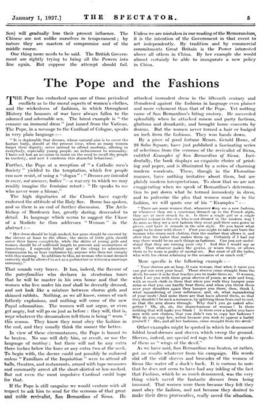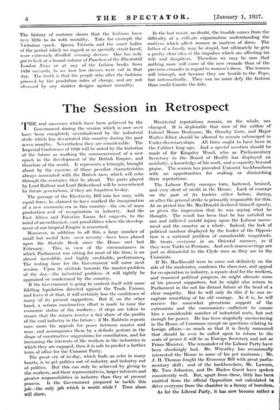The Pope and the Fashions
THE Pope has embarked upon one of those periodical conflicts as to the moral aspects of women's clothes, and the wickedness of fashions, in which throughout History the honours of war have always fallen to the adorned and adornable sex. The latest example is " the censure on immoral dress " just issued from the Vatican. The Pope, in a message to the Cardinal of Cologne, speaks in very plain language :- " It is deplorable that dresses, whose natural aim is to cover the human body, should at the present time, when so many women forget their dignity, serve instead to offend modesty, offering to everybody, especially young people, an inducement to sensuality. I have not lost an occasion to insist on the need to recall the people to modesty, and now I condemn this shameful behaviour."
Further, the Pope at a reception of " a Catholic men's Society " yielded to the temptation, which few people can now resist, of using a "slogan" : "Dresses are intended to cover, not uncover, bodies "—a war-cry to which we may readily imagine the feminine retort : " He speaks to me who never wore a blouse."
The high dignitaries of the Church have eagerly endorsed the attitude of the Holy See. Rome has spoken, and so there is an end of further discussion. The Arch- bishop of Bordeaux has, greatly daring, descended to detail. In language which seems to suggest the Ukase of a Modiste he thus addresses " Woman " in the abstract :- " Her dress should be high-necked, her arms should be covered by the sleeves at least to the elbow, the skirts of little girls should cover their knees completely, while the skirts of young girls and women should be of sufficient length to prevent any accusations of immodesty. I expressly forbid any of the clergy to administer Communion to, or hear confession by, anyone who does not comply with this warning. In addition to this, no woman who is not dressed correctly shall be allowed to act as a godmother or witness a marriage ceremony."
That sounds very brave. It has, indeed, the flavour of the paterfamilias who declares in stentorian tones that he will be master in his own house and that the women who live under his roof shall be decently dressed, and not look like a mixture between chorus girls and skinned rabbits. Nothing, as we all know, comes of such fatherly explosions, and nothing will come of the new Papal admonition. The women will not argue, or even get angry, but will go on just as before : they will, that is, wear whatever the dressmakers tell them is being " worn " this season. They know they must obey the fashion in the end, and they usually think the sooner the better.
In view of these circumstances, the Pope is bound to be beaten. No one will defy him, or revolt, or use the language of mutiny ; but there will not be any extra three inches below the knee or any extra two at the neck. To begin with, the decree could not possibly be enforced unless " Familiars of the Inquisition " were to attend all balls, theatres, and restaurants, armed with tape measures and summarily arrest all the short-skirted or low-necked. But not even the most impulsive Cardinal could hope for that.
If the. Pope is still sanguine we would venture with all respect to ask him to send for the sermons of that great and noble revivalist, San Bernardino of Siena. He attacked immodest dress in the fifteenth century and thundered against the fashions in language even plainer and more vehement than that of the Pope. Yet nothing came of San Bernardino's biting oratory. He succeeded splendidly when he attacked misers and party factions, gluttons and drunkards, and brought home converts by dozens. But the women never turned a hair or budged an inch from the fashions. They won hands down.
By a piece of good fortune Messrs. Gerald Howe, of 23 Soho Square, have just published a fascinating series of selections from the sermons of the revivalist of Siena, entitled Examples of San Bernardino of Siena. Inci- dentally, the hook displays an exquisite choice of print- ing and paper, and is illustrated by a series of charming modern woodcuts. These, though in the Florentine manner, have nothing imitative about them, but arc plainly modern interpretations. To show that we are not exaggerating when we speak of Bernardino's determina- tion to put down what he termed immodesty in dress, and to pulverize the plea that women must be in the fashion, we will quote one of his " Examples " :- " There are some women that, whenever /hey see a new fashion, or whenever they see a courtesan dressed up in the French style, they are at once struck by it. Is there a single girl or a single married woman in the city who is not dressed in the modern way 7 As soon as they see a new fashion they must pull their own gown to pieces, and have it remade in the new style. Do you know what ought to be done with them ? First you ought to take and burn the woman who wears such clothes, then the mother that allows it, and after that the tailor that makes them up. Certainly if I had my way there would be no such things as fashions. Can you not under- stand that they are ruining your city ? And this I would say as well. That whoever makes the gowns, or wears them, or allows them to be worn is guilty of mortal sin. But most of all the tailor, who with his clever scheming is the occasion of so much evil."
More specific is the following example :- " Your sleeves are so long, 0 vain woman, that when it rains you can put one over your head. These sleeves come straight from the devil, because it is he that teaches you to make them so. 0 women, when I see you with these great sleeves of yours, so wide and long, with so much cloth in them that when you walk they hamper your arms so that you can hardly bear them, and when you throw them over your shoulders again they hamper you there, then, think I, what squandering of your substance, and, oh, what squandering of your souls ! And some there are that have altered them, so that they shouldn't be such a nuisance, by splitting them from end to end, so that the arm shows through. Why don't you go naked alto- gether ? Oh, oh, oh, the shamelessness of woman ! Is there nothing that will make you blush ? Is there ever a harlot you have seen with new clothes, that you didn't run to copy her fashions ? Why do you copy her, unless because you wish to appear a harlot yourself ? She, and all her fashions, come straight from the devil."
Other examples might be quoted in which he denounced folded head-dresses and sleeves which sweep the ground. Sleeves, indeed, are special red rags to him and he speaks of them as " wings of the devil."
As we have said, San Bernardino was beaten, or rather, got no results whatever from his campaign. His words slid off the stiff sleeves and brocades of the women of Siena like water off a duck's back. It is curious to note that he does not seem to have had any inkling of the fact that Fashion, which he so much denounced, was the very thing which saved the fantastic dresses from being immoral. That women wore them because they felt they must obey the fashion, and not because they desired to make their dress provocative, really saved the situation. The history of costume shows that the fashions have very little to do with morality. Take for example the Victorian 'poch. Queen Victoria and the court ladies of the period which we regard as so specially strait-laced, wore extremely de colleti evening dresses. One has only got to look at a bound volume of Punch or of the Illustrated London News or at any of the fashion books from 1850 onwards, to sec how low dresses were cut in that day. The truth is that the people who alter the fashions proceed by the pendulum rules of change, and are not obsessed by any sinister designs against morality. In the last resort, no doubt, the trouble comes from the difficulty of a celibate organization understanding the motives which affect women in matters of dress. The father of a family may be stupid, but ultimately he gets a pretty clear idea of the impulses which are affecting his wife and daughters. Therefore we may be sure that nothing more will come of the new crusade than of the previous crusades in regard to women's dress. The women will triumph, not because they are hostile to the Pope, but automatically. They can no more defy the fashion than could Canute the tide.



































 Previous page
Previous page